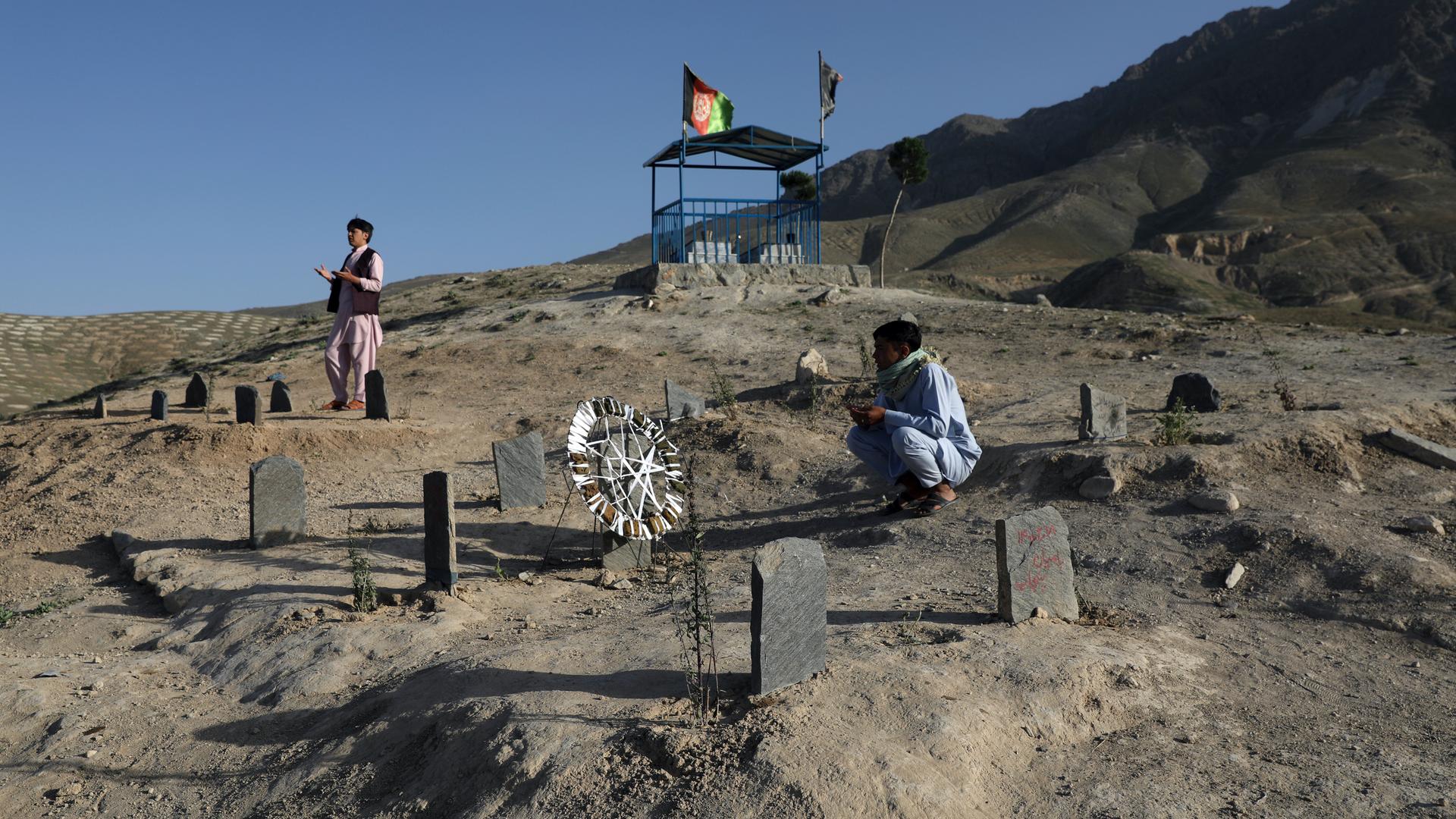‘Why don’t you have mercy?’: Afghanistan’s Hazara people increasingly face eviction, violence under Taliban rule
On a recent afternoon, residents of Daykundi Province in central Afghanistan were on the move.
Some people who’ve fled the area shared videos with The World showing kids herding a couple of dozen goats out of a village. Behind them, donkeys carry piles of blankets, clothes and pots and pans — whatever the villagers can manage to take with them in a rush.
Related: Unaccompanied minors are among the thousands evacuated from Afghanistan
This is the fate of hundreds of families, according to reports from victims, witnesses and human rights activists. They have been forced out of their homes by the Taliban over the past few weeks.
The mistreatment of the Hazara people in Afghanistan is nothing new. The Taliban and the Islamic State Khorasan Province, which is also known by the acronyms ISIS-K, ISKP and ISK, have carried out brutal attacks against the ethnic group for years. But since the Taliban takeover last month, forced evictions and violence against Hazara people are becoming more common.
Residents of Daykundi Province said that the Taliban ordered them to leave, sometimes giving them only three or four days to pack up and go. Then, after families are gone, the Taliban set fire to their homes or blow them up — some of those who’ve fled say they have watched it happen from afar.
One video taken from a hilltop shows smoke rising from a family’s home. A few minutes later, a blast rips through the mud structure, destroying it completely.
Related: How will the Taliban interact with militant groups like ISIS-K and al-Qaeda in Afghanistan
Forty-two-year-old Haji Mohammadi is one of those driven out of his home, where his family has lived for generations. He was born and raised in the house that was then set ablaze. He fled Daykundi with his family — wife, three daughters and five sons — and is now taking refuge in the capital, Kabul.
Mohammadi said that since early September, the Taliban have been telling people that several areas in Daykundi Province now belong to the Taliban and their supporters. When people complained, he said, they were arrested and taken away.
Taliban amnesty?
This week, an Amnesty International investigation found that at least 13 Hazara people were killed by Taliban fighters in Daykundi Province.
“Nine former members of government security forces were extrajudicially executed after surrendering,” the report concluded. “Victims included a 17-year-old girl who was caught in the crossfire.”
The findings are in line with what Mohammadi described to The World.
Related: Afghan women sidelined under new Taliban rule: ‘This country places no value on me as a woman’
“When the Taliban took over our province, they executed Afghan army soldiers, even after they surrendered,” Mohammadi said.
He added that Taliban men also killed civilians, including women and children. Videos of executions of Hazara people have been shared online.
When the Taliban took over Afghanistan back in August, they said they would grant amnesty to those who worked in the previous government.
“Nobody will be harmed in Afghanistan,” Taliban spokesperson Zabiullah Mujahid said in a news conference in August. “Of course, there is a huge difference between us now and 20 years ago.”
However, accounts like those of Mohammadi and others in Afghanistan tell a different story.
A Taliban spokesman did not respond to The World’s request for comment.
Related: The Taliban want international recognition. Countries are debating.
Saleem Javed, a human rights advocate based in Sweden, described the situation in Daykundi Province as dire.
“It’s estimated that about 1,500 to 1,600 families have been forced to leave their villages.”
“It’s estimated that about 1,500 to 1,600 families have been forced to leave their villages,” he said.
Daykundi and the surrounding areas are some of the most fertile regions in Afghanistan. In the past, disputes have arisen between Hazara people and nomadic people called the Kuchis. The Kuchis brought their livestock in these areas for pasture, destroying Hazara people’s farms and crops.
In the recent incident, Javed said, the Taliban ordered Hazara farmers “not to take their wheat, almond or any other agricultural products with them. Only some very basic necessaries.”
Residents say the Taliban are not preventing the Kuchis from encroaching on Hazara land.
The displaced Hazara families are taking shelter anywhere they can, he said. Some have fled to nearby provinces and are staying in mosques or abandoned buildings.
‘Have mercy’
In a video shared with The World, an older Hazara man in Daykundi addresses the Taliban.
“I am 65 years old and I have lived on this land all my life,” he says. “Now, you are telling me to leave? Why don’t you have mercy?”
Reyhaneh Azad, a former member of Afghanistan’s parliament who represented Daykundi Province up until last month, said she has been getting frantic messages from back home.
Azad, who got death threats after the government fell, and fled to Albania, said people reach out to her any way they can — on Facebook, WhatsApp and text messages.
“But what can I do for them?” she said. “I have no power now.”
As the winter months get closer, and much of the world’s attention on Afghanistan fades away, Azad said she worries about the fate of displaced Hazaras and so many others in her country.
“The Taliban took everything from us. Now, they are taking away our land and homes,” she said.
The World is an independent newsroom. We’re not funded by billionaires; instead, we rely on readers and listeners like you. As a listener, you’re a crucial part of our team and our global community. Your support is vital to running our nonprofit newsroom, and we can’t do this work without you. Will you support The World with a gift today? Donations made between now and Dec. 31 will be matched 1:1. Thanks for investing in our work!
